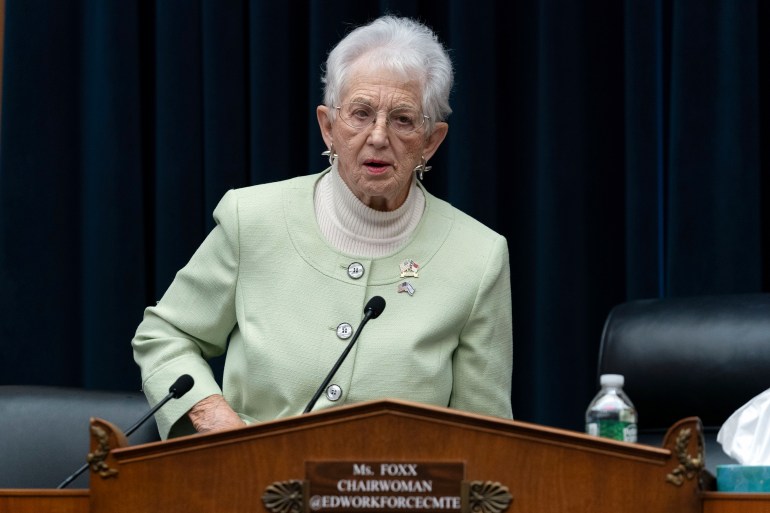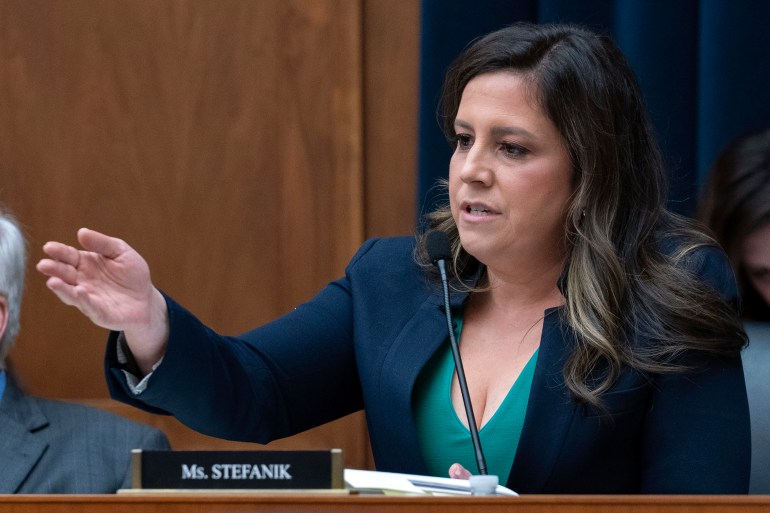Columbia University leaders appeared before a US Congressional committee to face questions about alleged anti-Semitism on campus.
The hearing was a sequel of sorts to a similar panel held in December, featuring the presidents of Harvard, the University of Pennsylvania and the Massachusetts Institute of Technology (MIT).
But on Wednesday, Columbia University President Nemat “Minouche” Shafik sought to avoid the same pitfalls that made the previous hearing viral.
She promised strong action to combat anti-Semitism, even participating in discussions about specific Columbia professors and disciplinary measures during the hearing.
“We have already suspended 15 Columbia students. We have six on disciplinary probation,” Shafik said, laying out his actions before the Education and Workforce Committee, part of the House of Representatives.
“These are further disciplinary actions that have been taken over probably the last decade at Columbia. And I promise you, from the messages I hear from students, they are getting the message that violations of our policies will have consequences.”
Still, Republicans on the committee sought to hold Columbia University accountable for what they saw as failures since the start of the war in Gaza on October 7.
On that date, the Palestinian group Hamas attacked southern Israel, killing more than 1,000 people. In the ensuing war, Israeli attacks on Gaza killed more than 33,800 Palestinians, sparking widespread protests.
Like many college campuses, Columbia University has been a center of student activism in the months since, with protesters demonstrating both in support of and against the war.
But the university has received special scrutiny, given its prominence as a prestigious Ivy League school and its attempts to crack down on unauthorized gatherings.
Some critics have argued that the suspension of pro-Palestinian students and groups has harmed free speech on campus, while others allege that the administration has allowed a hostile atmosphere to thrive.
Partisan division over campus activity
Committee Chairwoman Virginia Foxx opened Wednesday’s hearing with a statement defending the view that campus administrators failed to create a safe learning environment for Jewish students.
She pointed to pro-Palestinian activism as proof that Columbia and other campuses have “emerged into hotbeds of anti-Semitism and hatred.”
“Columbia is guilty of, at best, gross negligence — and, at worst, has become a platform for those who support terrorism and violence against the Jewish people,” she said in prepared remarks.
His statement referred to an incident that occurred on October 11, when an Israeli student was allegedly beaten with a stick while hanging posters of prisoners taken by Hamas.
But at several points during the hearing, representatives took to the microphone to emphasize that anti-Semitism was part of a broader problem of discrimination and hate in the United States.
“Anti-Semitism is not the only form of hatred growing in our schools. It is not the only form of hate that is affecting our children’s or students’ ability to learn,” said Representative Teresa Leger Fernandez, a Democrat, in her place on the committee.
“Islamophobia and hate crimes against LGBTQ students have also increased recently. They have led to deaths by suicide and harassment. But this committee has not held a single hearing on these issues.”
Meanwhile, Representative Ilhan Omar, a prominent progressive voice in the House, sought to dispel any combination of anti-war protests with anti-Jewish hatred.
“Have you ever seen a protest saying, ‘We are against the Jewish people’?” Omar asked Columbia President Shafik, who replied, “No.”
Omar went on to highlight the case of pro-Palestinian students who were sprayed with a smelly chemical at Columbia and were “harassed and intimidated” in other cases.
“There has been a recent attack on the democratic rights of students across the country,” she said.

Controversy hovers over audition
Shafik sought to walk a fine line during the hearing, promising swift and decisive action against anti-Semitism while also highlighting his campus’s commitment to free speech.
She was joined by Claire Shipman and David Greenwald of Columbia’s board of trustees, as well as David Schizer, a member of the campus anti-Semitism task force.
But the specter of the December hearing, which led to the dismissal of two university presidents, hung over the process.
On December 5, Claudine Gay of Harvard, Liz Magill of the University of Pennsylvania, and Sally Kornbluth of MIT faced the same committee on questions about anti-Semitism on their campuses.
During the meeting, Republican Representative Elise Stefanik pressed university presidents to explain – with simple yes or no answers – whether “calling for the genocide of Jews” would violate their campus codes of conduct.
In each case, university presidents sought to differentiate between protected speech and harassment, leading to complicated responses.
“If the speech turns into conduct, it could be harassment, yes,” said Magill. She later added: “It’s a decision that depends on the context, congressman.”
Clips of the hearing went viral shortly afterward, with politicians on both sides of the aisle criticizing university presidents for failing to make a forceful denunciation of anti-Semitism and genocide.
Magill resigned four days after the hearing as public outrage grew. Gay — Harvard’s first black president — also resigned in January, facing pressure not only over the hearing but also over plagiarism concerns.
These developments cast a shadow over Wednesday’s panel, and several representatives made direct references to them.
Republican Rep. Aaron Bean, for example, applauded Columbia administrators for giving more direct answers than their counterparts at Harvard and the University of Pennsylvania.
“You have done something that you have not been able to do: you have been able to condemn anti-Semitism without using the phrase, ‘It depends on the context,’” he said.
“But the problem is: the action on campus does not match his rhetoric today.”
A Standard Approach to Hate
On Wednesday, Shafik and Columbia administrators were also pressed on many of the same issues as their colleagues at Harvard, MIT and the University of Pennsylvania.
Republicans on the committee asked them to participate in chants such as: “From the river to the sea, Palestine will be free.” While some consider the chant anti-Semitic, others see it simply as a call for the creation of a Palestinian state.
“I’ve gotten letters from our Jewish teachers who say they don’t think it’s anti-Semitic either,” Shafik said at one point during the hearing.
But she also explained that she personally felt the language was “incredibly harmful.”
One recommendation she said the campus was considering would be creating specific spaces for these types of protests.
“If you are going to sing, it should only be in a certain place, so that people who don’t want to listen are protected from having to listen to you,” Shafik said, conveying the idea.
Schizer, however, indicated that he advocated a standard approach to hate and harassment, regardless of who was targeted.
“I’m conservative. I’m close to a lot of conservative students. There were times when they were given the signal that they should really go slow on a specific event or not articulate a specific position because it made others feel uncomfortable,” Schizer said.
“And it’s amazing how this kind of language wasn’t applied to Jewish students. When Jewish students said, ‘We feel uncomfortable,’ the emphasis was, ‘No, no, no, free speech.’”
“Now I want to be clear: I think freedom of expression is essential, but I also think consistency is essential. We need to have the same approach for everyone.”

Teachers under attack
Some of the fiercest criticism, however, fell on Columbia professors who were not present at the hearing.
Committee members cited statements from professors such as Joseph Massad, Mohamed Abdou, and Katherine Franke as evidence of prejudice and discrimination among Columbia faculty.
“We have 4,700 professors at Columbia, most of whom devote all of their time to teaching their students,” Shafik said at one point while defending his hiring practices.
“I have five cases right now that have been removed from the classroom or dismissed.”
In the case of Abdou, a visiting professor, Stefanik confronted Shafik with a post he wrote on social media on October 11, saying he was “with Hamas.”
“He will never work at Columbia again,” Shafik responded. “He was fired. And not only fired, but files on him will show he will never work at Columbia again.”
Massad, meanwhile, was criticized for an article he wrote in the publication Electronic Antifada, describing the October 7 attack as an act of “groundbreaking Palestinian resistance.”
“Mr Massad is under investigation,” Shafik said, adding that he believed the professor had been removed from a leadership position at the university.
This story originally appeared on Aljazeera.com read the full story






































